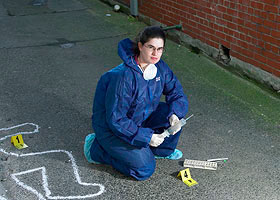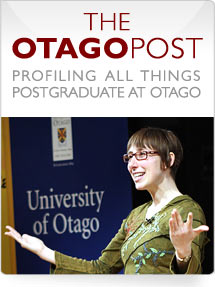 Monday 16 June 2014 3:17pmThe Otago Post issue 7
Monday 16 June 2014 3:17pmThe Otago Post issue 7
Biochemistry PhD candidate Andrea Donaldson
As a child, PhD candidate Andrea Donaldson used to write about solving murderous crimes. Now she's well on the way to doing so in real life with her research into a blood test that could make autopsies obsolete as a tool for establishing time-of-death.
“I'm trying to find biomarkers in the bloodstream, such as proteins or metabolites — materials such as glucose produced during metabolic processes — which will help me ascertain when a person died,” explains Andrea.
“The standard methods used in forensics to estimate time-of-death are measurement of body temperature, rigor mortis, liver mortis (settling of the blood), levels of potassium in the eye fluids and the study of insect activity. The accuracy of all these methods is affected by factors such as temperature, humidity, coverings, burial, medications, health status, degree of wounding and age, all of which alter the rate of decay.”
“I chose to focus on blood because it's easy to access, present in large amounts, doesn't clot post mortem and contains nutrients and waste products from all tissues in the body.”
“If this works then it's going to change forensics hugely,” Andrea says. “With this method, instead of being out by 24 hours we could be accurate down to four to five hours, or less. An autopsy will no longer be required unless the cause of death isn't obvious, because a blood sample will do.”
Dealing with blood is not a straightforward matter for Andrea, who is part Māori.
“My grandmother is Ngati Maniapoto,” she explains, “and for Māori blood is one of the most sacred elements of the body — it's the spirit of the person.”
“At the moment I'm using rat's blood for my research, but I will be using human blood eventually. Blood needs to be collected in an appropriate way, and I will also have to offer people their blood back when I'm finished. Plus the containers I will use to store the blood will have to be blessed before they are carefully disposed of.”
Andrea is familiar with the cultural guidelines, not least because she is a registered nurse.
“When I left school you couldn't study forensics in New Zealand,” she says, “you had to go to America or Britain. So I trained as an emergency nurse to gain exposure to blood, injuries and death to see if I could handle it. As part of that training I learned how to handle blood safely and the cultural guidelines around blood.”
Andrea nursed part-time through her Masters degree, but a PhD scholarship from the Foundation of Research Science and Technology and the Te Tipu Putaiao Fellowship have enabled her to concentrate full-time on her doctoral studies, giving her the opportunity to devote herself to her longtime forensics ambition.
For more information about postgraduate study in Forensics at the University of Otago visit: Department of Biochemistry